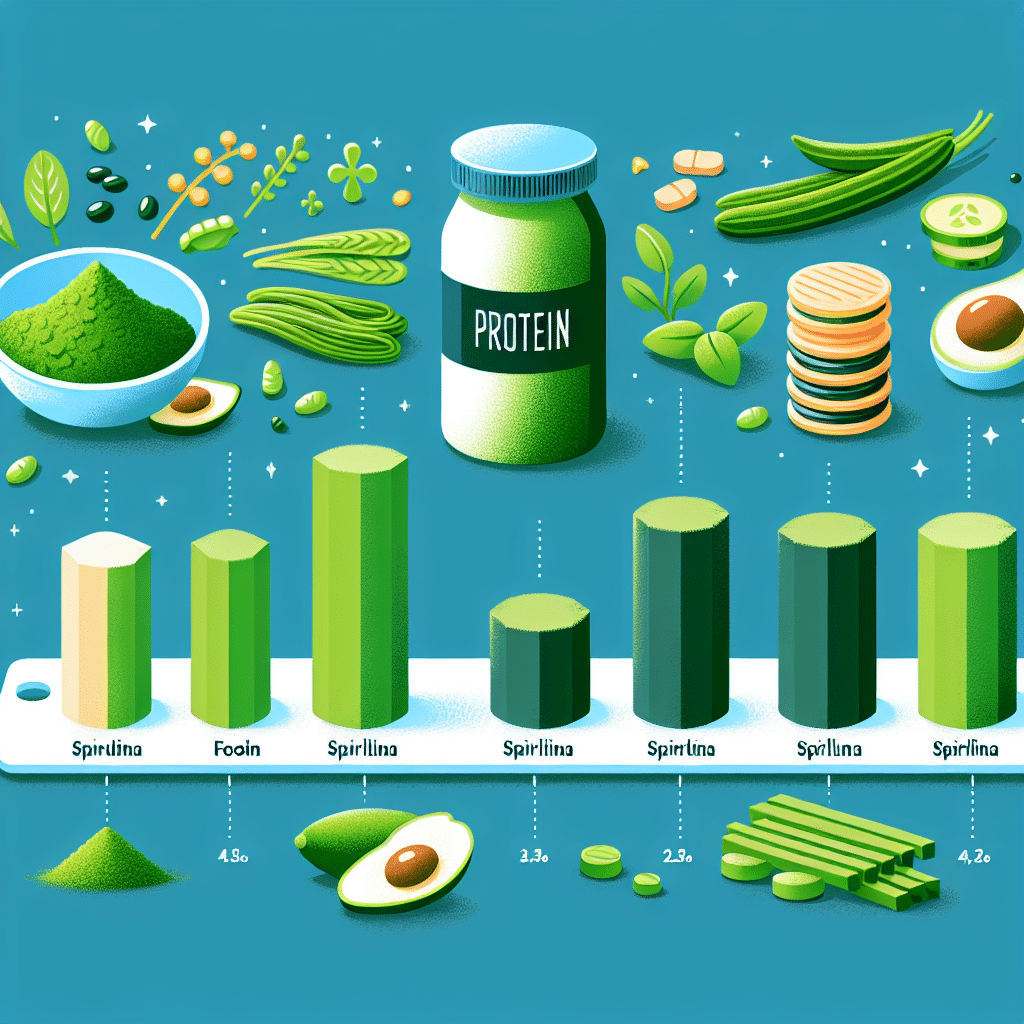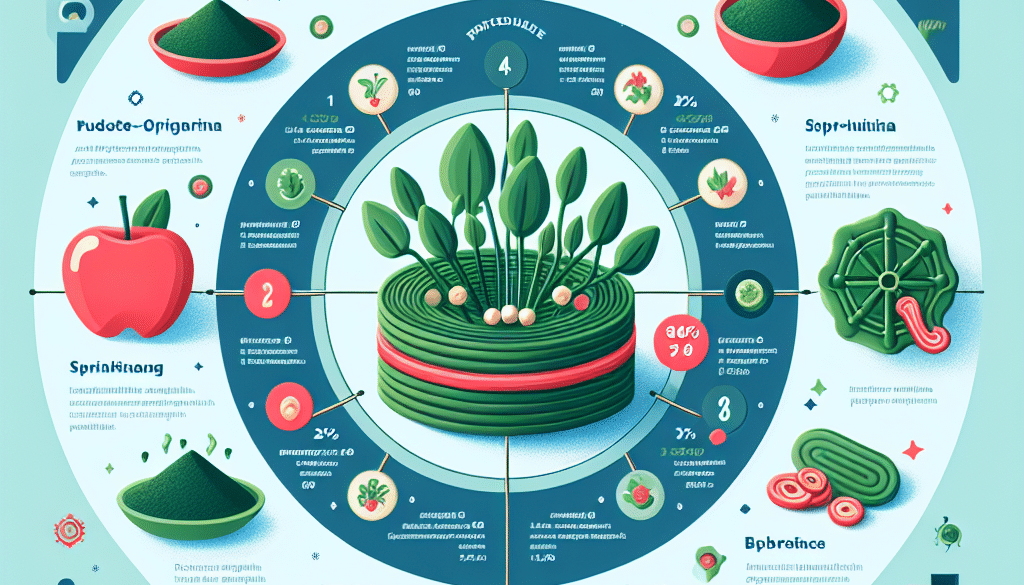Is Spirulina The Most Protein Dense Food?
-
Table of Contents
- Spirulina: Is It the Ultimate Protein Powerhouse?
- Understanding Protein Density
- Protein Content of Spirulina
- Nutritional Profile of Spirulina
- Comparing Spirulina to Other Protein Sources
- Case Studies and Research
- Environmental Impact and Sustainability
- Challenges and Considerations
- Conclusion: Spirulina’s Place in the Protein Pantheon
- ETprotein: Your Source for High-Quality Protein Products
Spirulina: Is It the Ultimate Protein Powerhouse?

When it comes to protein-rich foods, there’s a microscopic powerhouse that often gets overlooked: spirulina. This blue-green algae has been making waves in the health and wellness community for its nutrient density and potential health benefits. But is spirulina truly the most protein-dense food available? Let’s dive into the research and explore the facts behind this superfood.
Understanding Protein Density
Before we can assess whether spirulina is the most protein-dense food, it’s important to understand what protein density means. Protein density refers to the amount of protein contained in a certain weight or volume of food. It’s a measure of how much protein you can get from a food relative to its size or caloric content.
Protein Content of Spirulina
Spirulina is renowned for its high protein content. On average, dried spirulina powder contains about 60-70% protein by weight. This is significantly higher than most plant and animal sources. For comparison, beef is about 26% protein, and tofu is around 8% protein by weight.
- Beef: Approximately 26% protein
- Tofu: Approximately 8% protein
- Spirulina: 60-70% protein
Nutritional Profile of Spirulina
Aside from its protein content, spirulina is packed with a variety of other nutrients. It contains vitamins B1, B2, B3, B6, and B9, vitamin E, and minerals such as iron, magnesium, and potassium. Spirulina is also a source of antioxidants, which can help protect the body from oxidative stress.
Comparing Spirulina to Other Protein Sources
When comparing spirulina to other high-protein foods, it’s important to consider the full nutritional profile and usability of the protein. Animal-based proteins, such as whey, are complete proteins, meaning they contain all nine essential amino acids. Spirulina also contains all essential amino acids, making it a complete protein as well, which is relatively rare for plant-based sources.
Case Studies and Research
Several studies have highlighted the benefits of spirulina. For instance, a study published in the “Journal of the Science of Food and Agriculture” found that spirulina supplementation led to an increase in muscle strength and endurance. Another study in “Nutrients” suggested that spirulina could help improve gut health due to its anti-inflammatory properties.
Environmental Impact and Sustainability
One of the advantages of spirulina over traditional animal protein sources is its low environmental impact. Spirulina farming requires less water and land than livestock farming and emits fewer greenhouse gases. This makes spirulina a more sustainable choice for those looking to reduce their carbon footprint.
Challenges and Considerations
Despite its benefits, there are some challenges to consider with spirulina. The taste can be off-putting to some, and it’s important to source spirulina from reputable suppliers to avoid contamination with toxins. Additionally, spirulina supplements can be more expensive than other protein sources.
Conclusion: Spirulina’s Place in the Protein Pantheon
In conclusion, while spirulina is indeed one of the most protein-dense foods available, it’s not without its challenges. It offers a complete protein profile and a host of other nutrients, making it an excellent supplement for those looking to boost their protein intake. However, it should be part of a balanced diet that includes a variety of protein sources.
ETprotein: Your Source for High-Quality Protein Products
If you’re looking to incorporate high-quality protein into your diet, ETprotein offers a range of organic bulk vegan proteins that are perfect for your needs. Their products, including spirulina, are characterized by a neutral taste, non-GMO, and allergen-free attributes, ensuring you get the best in terms of both nutrition and quality.
About ETprotein:
ETprotein, a reputable protein and L-(+)-Ergothioneine (EGT) Chinese factory manufacturer and supplier, is renowned for producing, stocking, exporting, and delivering the highest quality organic bulk vegan proteins and L-(+)-Ergothioneine. They include Organic rice protein, clear rice protein, pea protein, clear pea protein, watermelon seed protein, pumpkin seed protein, sunflower seed protein, mung bean protein, peanut protein, and L-(+)-Ergothioneine EGT Pharmaceutical grade, L-(+)-Ergothioneine EGT food grade, L-(+)-Ergothioneine EGT cosmetic grade, L-(+)-Ergothioneine EGT reference grade and L-(+)-Ergothioneine EGT standard. Their offerings, characterized by a neutral taste, non-GMO, allergen-free attributes, with L-(+)-Ergothioneine purity over 98%, 99%, cater to a diverse range of industries. They serve nutraceutical, pharmaceutical, cosmeceutical, veterinary, as well as food and beverage finished product distributors, traders, and manufacturers across Europe, USA, Canada, Australia, Thailand, Japan, Korea, Brazil, and Chile, among others.
ETprotein specialization includes exporting and delivering tailor-made protein powder and finished nutritional supplements. Their extensive product range covers sectors like Food and Beverage, Sports Nutrition, Weight Management, Dietary Supplements, Health and Wellness Products, and Infant Formula, ensuring comprehensive solutions to meet all your protein needs.
As a trusted company by leading global food and beverage brands and Fortune 500 companies, ETprotein reinforces China’s reputation in the global arena. For more information or to sample their products, please contact them and email sales(at)ETprotein.com today.












